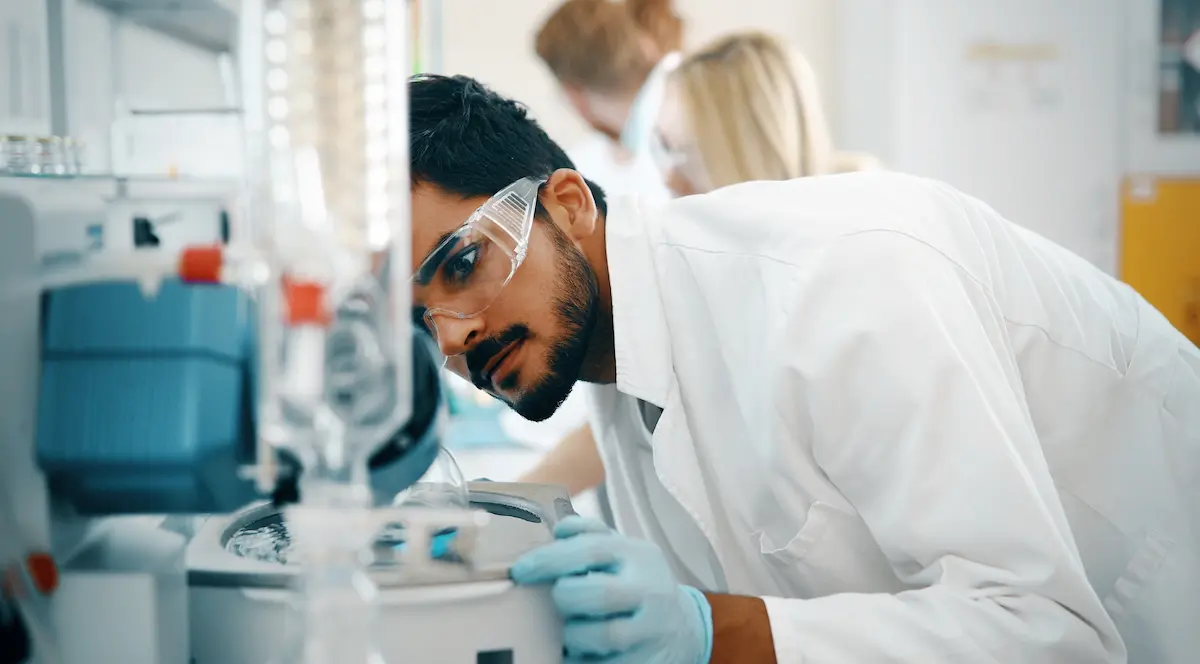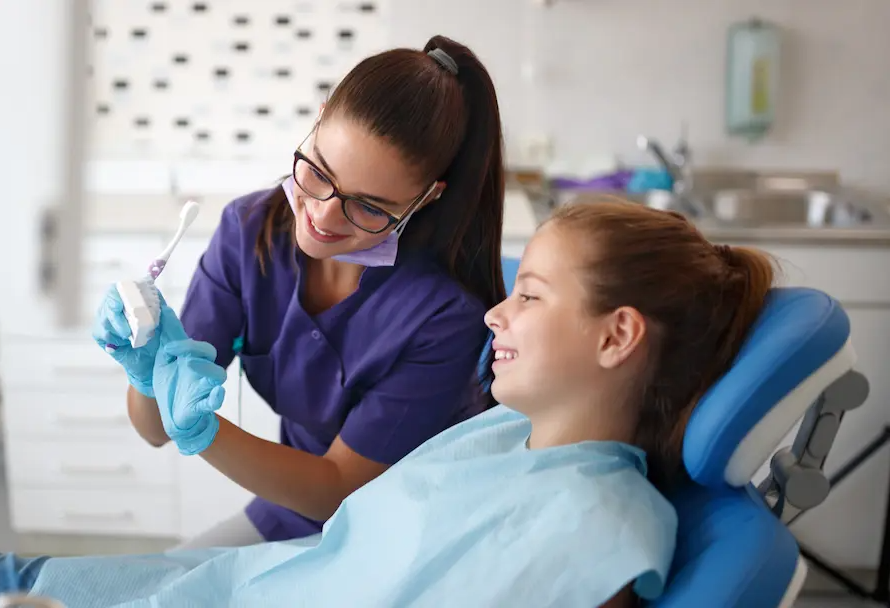As you can probably tell by now, there are many different career options when it comes to allied health. So far, our series has covered radiology and imaging, rehab and therapy, and surgical services in allied health. Disciplines in the laboratory area of healthcare are also great career options for allied health professionals. This blog will cover everything you need to know about the various career options in the laboratory field.
Cytotechnologist
These allied health professionals are responsible for analyzing cell samples under a microscope to identify potential indicators of cancer and other illnesses. The cell samples cytotechnologists examine come from Pap smears, fine-needle aspirations, and other samples containing bodily fluid (CareerExplorer, n.d.). Because of the importance of early detection when it comes to cancer or other illnesses, these healthcare professionals play an essential role in maintaining a patient’s health.
Education requirements
If you’re looking to pursue a career in cytotechnology, you’ll first need to earn a bachelor’s degree from an accredited university either in cytotechnology, life sciences, or biology. It is also important to note that a cytotechnology program and certification might also be required depending on where you want to work (Mayo Clinic College of Medicine and Science, n.d.). Some states also require a license to practice as a cytotechnologist, so it would be beneficial to first find out if this is a necessary step for you to take before taking a licensing examination.
Skills
To be successful in your role as a cytotechnologist, you will need to be a solid communicator, highly attentive to detail, able to supervise, work well with technology, and understand laboratory operations.
Histotechnologist
Part of the laboratory team, histotechnologists diagnose patients’ diseases by preparing and examining tissue samples under a microscope (National Society for Histotechnology, n.d.). The samples these allied health professionals collect are often stained with dyes to reveal cellular structures that are used for diagnosis. The collected samples come from autopsies, biopsies, and surgeries (CareerExplorer, n.d.). Healthcare professionals interested in showing off their creative side are perfect for this role, as histotechnologists are able to mix art and science in their everyday lives. The chemical dyes that are used for staining cell samples display vibrant colors, while also allowing for science to come into play with the need for diagnoses. (National Society for Histotechnology, n.d.). In this more creative and artistic regard, histotechnologists differ from other healthcare professionals.
Education requirements
To begin your career as a histotechnologist, you’ll first need a science-related bachelor’s degree. The second step to becoming a histotechnologist is to earn a histotechnologist (HTL) certification from an accredited program. Although not all states require a certification, it will help boost your career, give you further credibility, and make you more valuable when working in the field. The American Society for Clinical Pathology offers the Histotechnologist examination, and once you achieve a passing score, you’ll gain access to a certification as an HTL (Goodwin University, 2021).
Skills
Common skills that will benefit a histotechnologist consist of problem solving, strong communication, data analysis, attention to detail, and the ability to work under pressure. If you think you possess these skills, consider taking up a career in histotechnology!
Laboratory assistant
Responsible for being a researcher and scientists “right hand man”, laboratory assistants support and aid in any way they can. These allied health professionals will typically prepare lab equipment, clean the area where experiments are conducted, process specimens and lab tests, and more (learn.org, n.d.).
Education requirements
At the very least, you’ll need a high school diploma or GED to become a laboratory assistant. However, you might also want to earn an associate degree, or even a bachelor’s degree as some employers may require it. Once you’ve obtained a degree, you might want to consider applying for an internship to gain hands-on experience in a more educational setting. Lastly, you may want to think about getting a certification from The American Society for Clinical Pathology (ASCP). Although you are not required to get a certification, it could help you land your dream job and will allow for higher pay rates (Learn.org, n.d.).
Skills
Lab assistants need to be communicative, analytical, and attentive when working a shift. They also need to be able to demonstrate procedures, document lab activity, maintain records, prepare samples, and more.
Medical laboratory technician
These healthcare professionals are responsible for assisting doctors so that they can accurately diagnose and treat patients. Medical laboratory technicians often collect and prepare samples, perform tests, log test data, and more. These allied health professionals play a crucial role in helping doctors determine a patient’s diagnosis, which often makes the job more rewarding (Coursera Staff, 2023).
Education requirements
If you’re interested in pursuing a career as a medical laboratory tech, you’ll first need to earn either an associate degree or a bachelor’s degree. Similar to a laboratory assistant, a certification or license may be required based on the state you plan to practice in. It’s important to do research before you decide to become a certified lab technician so that you prioritize your time and money. However, many medical lab technicians decide to get a certification regardless so that they can earn higher pay (Coursera Staff, 2023).
Skills
Necessary skills for this career include customer service, attention to detail, communication, data entry, teamwork, critical thinking, dexterity, and problem solving.
Medical laboratory scientist
Also referred to as medical technologists, these allied health professionals are trained to perform tests on samples, as well as report their findings to physicians so they can inform patients. Medical laboratory scientists are crucial to the team because they identify medical conditions like cancer and other diseases (Mayo Clinic College of Medicine and Science, n.d.). When found and treated early on, this can save patients, and even allow them to live perfectly healthy lives.
Education requirements
A bachelor’s degree from a program or university accredited by the National Accrediting Agency for Clinical Laboratory Sciences (NAACLS) is required if you want to work as a medical laboratory scientist. This degree can be in medical technology or a related science field. Once you’ve earned a degree, you will likely want to consider becoming licensed as many states require state-specific licenses to work as a medical laboratory scientist. Finally, you should look into getting certified by a well-known association so that you can further your skills and become more valuable to employers (American Medical Technologists, 2022).
Skills
As a practicing medical laboratory scientist, you’ll need to be able to effectively communicate, think critically, be able to analyze data, have good hand-eye coordination, and be attentive to detail (Master’s in Public Health Degree Programs, n.d.).
Pathology assistant
Pathology assistants are skilled allied health professionals who assist board certified pathologists with examinations, diagnoses, and recording findings (Mayo Clinic College of Medicine and Science, n.d). Typical responsibilities include sending samples off for testing, taking photographs of patient’s organs and other body parts, examining parts of the body that have been removed or surgically operated on, and more (Mayo Clinic College of Medicine and Science, n.d).
Education requirements
To work as a pathology assistant, it will be necessary to first earn a bachelor’s degree in a field related to life sciences. After this, a pathologists’ assistant program will need to be completed, which typically takes two years. An added bonus of this program is that you receive your master’s degree upon successful completion (Mayo Clinic College of Medicine and Science, n.d). The last step to becoming a pathology assistant is to get certified through the American Society for Clinical Pathology (ASCP). This certification is valid for three years until it needs to be renewed (Mayo Clinic College of Medicine and Science, n.d).
Skills
To be a pathology assistant, it’s important to be skilled in teamwork, communication, photography, attention to detail, and laboratory procedures.
These allied health professionals play a crucial role in the diagnosis and treatment of patient’s diseases and illnesses. If you think you might be interested in pursuing a career in the laboratory field, search our jobs! The world always needs more healthcare professionals in it. We hope you learned more about the many career options in laboratory.
Sources
https://www.careerexplorer.com/careers/cytotechnologist/
https://www.nsh.org/about/about-histotechnology/why-histotechnology
https://www.careerexplorer.com/careers/histotechnologist/
https://www.goodwin.edu/enews/how-to-become-a-histotechnician-or-histotechnologist/
https://learn.org/articles/What_Do_Laboratory_Assistants_Do.html
https://www.coursera.org/articles/medical-laboratory-technician
https://americanmedtech.org/Blog/Blog-Post/How-to-Become-a-Medical-Laboratory-Scientist




